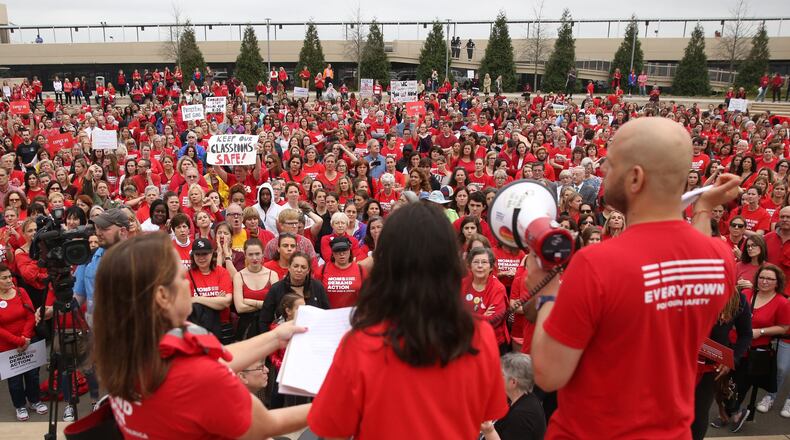The organizers of a protest against gun violence in Atlanta are threatening legal action if the state restricts them from using a plaza outside the statehouse, weeks after officials cut power to another gun control rally on Capitol grounds.
State Rep. Mary Margaret Oliver said in a letter Monday to state building officials that the state will face "unnecessary litigation and costs" if it rejects a request by the "March for Our Lives" organizers to gather at Liberty Plaza on March 24.
“Issues of structure, convenience, and safe access all led to creation of the Plaza, and your web site features a lovely picture of the Plaza and comments on its use and success,” Oliver wrote to Steve Stancil, the head of the Georgia Building Authority.
“To deny permits of citizens who are doing exactly what we wanted them to do, to come to their Capitol and offer their views, is bad management.”
She and other Democratic lawmakers and activists were infuriated in February when state officials turned off the electricity to Liberty Plaza speakers as more than 1,500 people gathered at a Moms Demand Action gun-control rally. The event still went forward, though attendees had to strain to hear the speakers.
Stancil told Oliver that staffers manually cut electricity to the $4.4 million plaza because the group didn’t have proper permits. He also said that the policies are “neutral to the content of the message” and that he’s turned down other groups that didn’t follow procedure.
His office declined comment on Monday, as did Attorney General Chris Carr. Deal’s top aide, Chris Riley, said on Twitter the state’s decision boiled down to security costs.
“When event sponsors wish to use our Capitol grounds for events that occur on Saturday and Sunday, there is a cost factor in regards to our law enforcement ... required to work overtime,” he wrote. “Hopefully, litigation will not be required to maintain this orderly process.”
The March 24 rally is one of dozens across the nation spearheaded by students who survived the Feb. 14 mass shooting at a Florida high school.
The Georgia offshoot is getting help from the Georgia Alliance for Social Justice, the group that originated from the Atlanta Women's March in 2017. Several thousands have indicated on the event's Facebook page that they plan to attend.
Oliver’s legal threat targets new guidelines from the State Building Authority that require a state constitutional officer – a group of seven GOP officials - to sponsor a permit application to use the $4.4 million plaza for events held outside normal business hours.
The governor’s office denied her request to host the event, which is set for a Saturday. Other statewide officers are unlikely to sponsor an event for gun control.
“Without your positive action, the state will again face unnecessary litigation and costs,” she wrote to Stancil. “As a lawyer of several decades, litigation is always expensive, time consuming, and stressful, and should be avoided whenever possible.”
More: AJC Watchdog: Why the state cut the mic on the Ga. gun control rally
About the Author



